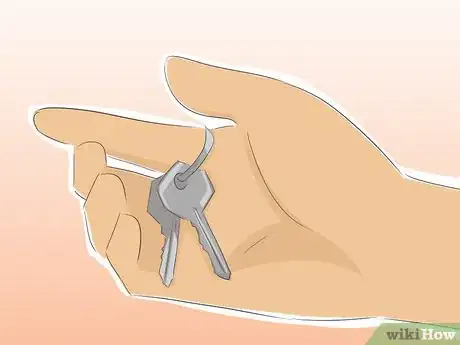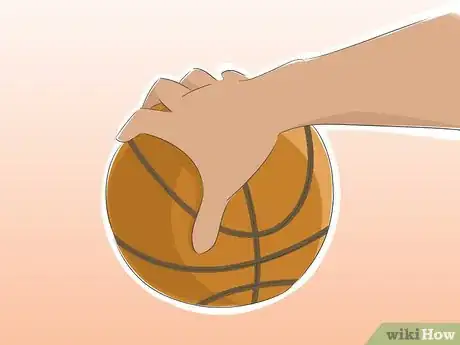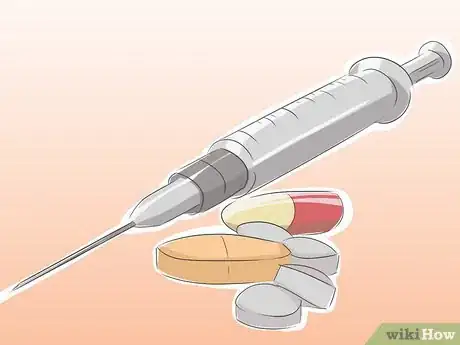This article was co-authored by Desiree Panlilio. Desiree Panlilio is a Teen Life Coach and the Owner of Encouraging Teens, LLC. With over three years of experience, she specializes in helping teens and young adults define roles, set goals, develop healthy academic and personal habits, grow in leadership potential, and create their life paths. Desiree holds a BSN in Nursing from The University of Victoria and an MA in Human Services Counseling with a concentration in Life Coaching from Liberty University.
There are 8 references cited in this article, which can be found at the bottom of the page.
This article has been viewed 132,281 times.
Entering college can be nerve-wracking. What you need is the "Freshmen Survival Guide." Whilst you are fairly unlikely to die during your freshman year, the following step-by-step guide can help to not only protect you from death, but make your year successful.
Steps
Registration
-
1Make sure all of your paperwork is in order to attend college.
-
2Check your tuition status. Make sure you and/or your family knows what has to be paid and when. Double-check billing addresses. This is apparently vital to your survival.Advertisement
-
3Select a meal plan or nutritional strategy that appeals to you. Some things to consider when choosing a meal plan are:
- Will you have a kitchen?
- Will you have a fridge or mini fridge?
- Do you have the budget and desire to eat out?
- Would you like to eat in dining halls? (Lots of social interaction can happen there.)
- Do you eat breakfast?
- Are there other sources of meals besides dining halls on campus?
-
4Find out when you have to declare your major. Some college require very early major declarations, while others are as late as end of sophomore year.
-
5Check on classes. If your college allows you to choose all your classes, make sure you are getting everything you need.
Personal Fitness and Hygiene
-
1Eat mindfully. Try to fill 1/3 of your plate with fruits and vegetables, and only eat one or two desserts per day. This will help you stay healthy and energized at school.[1]
- The "freshman 15" myth has been debunked by research: most first-year students only gain a small amount of weight, and this is normal for their age. Frequent, heavy drinking is the biggest risk for serious weight gain.
-
2Stay active. Whether you hit the gym a few times a week, or you join the aqua fitness class, or enjoy refreshing yoga, staying active is good for your mind as well as your body. The endorphins released during exercise can help you deal with stress.[2]
- If organized fitness isn't your thing, try walking, jogging, or going to the gym with headphones on.
-
3Limit your consumption of caffeine and energy drinks. They are addictive and can cause your energy levels to crash after the initial effect has worn off.
-
4Get enough sleep. Most students do best with 8-9 hours of sleep, though it varies by person. Sleep clears toxins from the brain, and it's important for your health.[3] Get enough rest. You will get better grades if you do, and your health will be better.
- If you don't get enough sleep on one night, get extra sleep to make up for it.
- Don't try to test your limits. In extreme cases, sleep deprivation can kill people. Routine sleep deprivation may shorten your lifespan.
- Try to keep a consistent sleep schedule. Students whose sleep schedules are more consistent have higher GPAs.[4]
-
5Recognize when "healthy habits" become unhealthy and obsessive. College years are the peak years for eating disorders, which can be deadly. Know the signs of an eating disorder and see a doctor right away, before things get worse.[5]
- Do you often think about your size, diet, or exercise habits?
- Do you feel guilty about eating, or keep your eating habits secret?
- Do you use starvation or exercise to punish yourself?
- Are you always pushing yourself to lose more and more weight?
-
6Recognize the difference between stress and mental illness. Everyone gets stressed sometimes. But if your stress is severe or interfering with your life, then you have a problem. Anxiety and depression are on the rise among young people. See a doctor if you experience one or more of the following: [6]
- You can't focus in class because of stress
- You miss class because of stress-related headaches, stomachaches, fatigue, or other illnesses
- You find yourself losing interest in your favorite hobbies or friendships
- Your eating or sleeping habits (eating/sleeping too much or too little) are harmed by stress
- You are becoming more and more isolated due to stress or fatigue
- You think it would be nice to die so you could escape from your problems
- Your stress is interfering with your ability to have a happy, functional life
-
7Prepare for weather. Find out if you'll need a winter coat or a raincoat ahead of time.
Dorm Life
-
1Hang out with your roommate(s) sometimes. Building a positive relationship can help you get along well, and it will give you a strong foundation of friendship for when you disagree. Getting along with your roommate(s) will help make your living situation easier.
- Try going on outings together. You could get food, explore the campus, attend an event, or join a club together.
- Be there for them. Cheer them on when they face challenges. Celebrate their successes. Console them and validate their feelings when they're upset.
- Respect their unique style. Some people are more introverted than others, and some want to hang out less than others. You don't have to be best friends with your roommate if you or they don't want to.
-
2Be assertive with your roommate. Be courteous, considerate, and establish boundaries. If you have a problem, don't be afraid to bring it up, but think carefully about how you address them.
- Use "I" statements, like "I can't sleep well with music. Would you please wear headphones after midnight?"
- Try the nonviolent communication style, in which you make observations, state needs, and make requests. For example, "When I came in, I saw that the door was left unlocked. I worry about the safety of our things if they're left like that. Please remember to lock the door behind you when you go."
-
3Set out ground rules. If you decide early on what is okay and what isn't, it will help avoid resolve conflicts later. Some important talking points:
- Music and noise. If you have really different taste in music, you may have to alternate music playing or resort to headphones. Set some "quiet hours" and some "loud hours" if you need too. For example, if one roommate likes to sing along to music, and one other doesn't like it, maybe the roommate can sing while the other is in class. Earplugs and white noise can also be helpful for noise management.
- Visitors. Do you mind platonic sleepovers? How about non-platonic? Set up rules about overnight visitors before you think you'll need them, to avoid awkwardness. Agree on a door signal or a message system ahead of time.
- Alcohol and partying. Talk about what is and is not okay. Maybe you are okay with a few friends over for beer, or maybe you want full party every weekend, or maybe you are not okay with any substances. Be willing to compromise both ways. It's not fair to forbid your roommate from being social in their own space, but it's also not fair to be constantly inundated with drunk people if it makes you uncomfortable.
-
4Keep things clean. Personal preferences vary, but be considerate of your roommate.
- There should not be any bad smells.
- There should always be a clear, wide walking path so that no one steps on anything.
- Microwaves and shared objects should not be gross.
-
5Watch your things. Theft and lost items can happen on campuses. Even small, relatively safe places can have accidents and thieves. Don't leave your things unsupervised.
- Dorm room. Lock the door to your dorm, even if you are only stepping out for a minute. (Locking your door before leaving is also a good way to avoid locking yourself out: you'll always remember your keys this way.)
- Bike. Always lock up your bike. On some campuses, people will steal one wheel, so lock up both your wheels if this is a problem.
- Laundry. Set a timer on your phone for when your laundry is done. If you don't pick it up, someone may throw it on the floor.
- Public spaces. Don't leave your laptop, phone, or other items alone in a public space, even for short periods of time. It only takes a few seconds for someone to steal your things.
- If you do lose a personal item, search for it, and try asking at a help desk or the RA's room. Someone may drop it off there. If it still doesn't show up, tell campus police in case they find it.
-
6Ask for help if you're struggling to solve a problem on your own. Typically, dorms have a residential director and residential assistants that can help make you feel at home while you're living in a dorm. If you’re having big issues with your rooming situation, contact resident life.
-
7Find out what's allowed. Some dorms are dry dorms, some are single-sex, some have very strict fire policies. You don't want to get in trouble.
- Space heaters, candles, fairy lights, and other fire hazards are usually not allowed.
-
8Be careful and courteous in shared bathrooms. If your dorm has shared bathrooms, it's important to avoid serious germs, and be mindful of others.
- Wear shower shoes! Some diseases can be transmitted through the feet. A pair of cheap flip-flops will do.
- If you make a mess, clean it up.
- Do your business and move on, especially if there are long lines. You don't want to make people wait too long.
-
9Clean up and lock up your room before going home for the holidays. You don't want your things to get stolen, lost, or thrown out by staff if they're in a common area.
-
10Call home as much as you'd like. Your family can help you sort out problems, and they can be there for you when you just want to chat.
- It's very normal to call more often when you're just starting school, and when you're having a tougher time.
Staying Focused
-
1Show up on time. Even if your teacher doesn't do anything to latecomers, it is disrespectful and you might miss something. Get up early to prepare for class.
- If you tend to lose track of time, set an alarm for when it's time to leave.
-
2Get yourself a planner. This can help you track your assignments, appointments, and other to-dos.
- You may decide to use an app like Habitica or ToDoIst to track what you need to do.
- Digital calendars can help you track things.
-
3Attend class every day (unless you are too sick). While some professors don't take attendance, showing up is still important to your grade. Your professor may talk about things that aren't in the textbook, and will show up on the exam. They may also explain things better than the textbook does.
- If you're sick, email a classmate to ask for the notes. You can also show up during office hours later to ask about what you missed.
- It's silly to spend thousands of dollars on school, and then not show up. That is a waste of your money.
-
4Talk to your professors if you have a disability. Many professors are happy to accommodate your needs. You can give them a heads-up after class or during office hours at the beginning of the school year.
- Your school's disability center can help get you accommodations, such as a private room for tests, extra time on tests, a sign language interpreter, or seating up front.
- "Disability" doesn't only mean blindness or needing a wheelchair. Anxiety, ADHD, depression, chronic fatigue, Tourette syndrome, autism, dyslexia, and more count as disabilities you can get accommodations for.
- Don't be afraid of getting accommodations. They're meant to remove barriers so that you can succeed just like the other students can.
-
5Keep the syllabus for each class on hand. A lot of teachers plan out the material ahead of time, so you can keep track of assignments more easily.
-
6Get the materials you need. Find out what textbooks you need ahead of time, so you aren't stuck with ridiculous college store prices or waiting on shipping. Some teachers are ruthless about having the textbooks on time.
-
7Create study hours for yourself. This time should be for studying and homework. Procrastination will be your downfall. Figure out if you work best in short bursts or long chunks. It's okay to take breaks, but plan them and don't get carried away.
-
8Take notes in class. You can use a notebook, tablet, or laptop. If you are struggling to pay attention, taking notes can also help you focus. If the teacher gives handouts, don't get complacent: pay attention and jot down extra details.
- Try color coding if you're a visual learner.
- Write down dates or textbook chapters. Try writing a title that summarizes the lesson.
-
9Avoid letting technology distract you in class. Most professors allow you to use laptops to type your notes in class. Show that their faith in you is not a mistake, and use technology wisely.
- If you have a laptop or tablet, use it for note-taking, not anything else.
- Some students, especially those with disabilities like ADHD or autism, need to fidget or doodle in order to focus. Choose a quiet activity that doesn't require much brainpower. Be discreet about it, and make sure you are still listening.
Studying
-
1Get tutoring as needed or desired. If you feel like you're not understanding the material in your classes, don’t be afraid to ask your professors or peers for help. The resources vary by college, so find out early how you can get help.
- Some people like to do schoolwork in the tutor center. It's a quiet place, and then if you need help, you can ask for it.
-
2Try forming small study groups. Ask your classmates if they want to study. It can make studying more fun, and you can learn a lot.
-
3Avoid over-stressing about grades. Grades are not the only measure of your skill as a student, and if they're not good, you often still have time to improve them. Focus on getting good grades, not perfect grades, and doing the best you can. If you did your best, that's a victory and you can feel proud.
- If you're worried about your grade, try going to office hours and asking your professor for help. Professors like students who take initiative and show up to office hours.
-
4Start studying early, so you don't have to cram. It helps to review your notes after each class, and ask questions if you have them. Then start studying for tests early, so that there is no rush. Try starting your studying a week before the actual exam.
-
5Treat yourself after working hard for an exam or project. Buy new clothes, eat a hearty meal, go out with friends, or take a long break to watch your favorite show and relax. Good effort is worth celebrating.
-
6Keep an eye on your grades. You don't want to be surprised when you get midterm or final grades. Instead, check your grades periodically so that you'll notice if something looks wrong or bad. You can talk to your professor if you're struggling.
- Professors like students who show up to office hours. Feel free to go there to ask questions or ask for help.
-
7Talk to librarians for research projects. They are typically quite knowledgeable about research. Expert librarians have a degree in library science, and have done research and published papers.
- Library science is more than organizing books. Librarians learn a little bit about all kinds of different subjects, enough so that they can usually understand the basics of your project and point you to what you need.
-
8Borrow books first before buying. Only consider buying them if you think you will find the useful in the future. Also consider buying their e-book version, if available, to save money.
- Avoid buying from the school store, if you can. Online retailers like Amazon are usually cheaper.
Getting Involved
-
1Explore around campus. You can take an official tour, or just wander around in your free time. You may find interesting places.
-
2Explore the area outside campus. Explore your town or city. Take notice of interesting places you can visit.
-
3Get involved in your campus organizations. Try something new and exciting, or meet friends with similar interests through activities you know you love.
-
4Check out living organizations. Language halls, sororities/fraternities, or other shared-interest housing can be a lot of fun.
-
5Buy some swag! Sweatshirts, T-shirts, water bottles... most colleges have a huge number of ways to show your college pride.
-
6Attend events that sound interesting. Dances, career fairs, open houses and more abound at college. You can meet new people and learn new things.
Talking to the Staff
-
1Get to know staff and faculty members. Faculty members can help mentor you and help you get started at school. They are there to provide you with the skills and resources necessary to help you succeed.
-
2Use your adviser. They were assigned to you to help you succeed. Often they have helpful advice about classes or even just about life.
-
3Be friendly to everyone. Don't just be nice to the professors or dean: talk to the cleaning crew, cafeteria workers, landscapers, and dorm staff. They will remember you, and smile whenever they see you. They'll also help you when you are in need.
-
4Make arrangements to stay on campus for holidays, if desired. If you don’t want to go home for the holidays, speak with your Residential Director. Sometimes they can arrange for you to stay on campus.
Socializing
-
1Don't be afraid to make friends. Whether you want a few close friends or a large circle of them, college can be a great place to build lasting friendships. Reach out and meet new people.
-
2Adjust your study schedule to work with your social schedule, if desired. For example, if you like to hang out or party on weekends, you might study harder on weeknights.
-
3Talk to upperclassmen. They often know the school better, and can give good advice on a number of subjects.
-
4Enjoy yourself. College should be about learning, but it should also be about having a life and growing as a person.
-
5Choose the social scenes that feel right for you. College stereotypes are of frat parties and kegs of beer, but it offers far more than that if that isn't your cup of tea. Don't feel like you have to push yourself into uncomfortable situations to make friends. Instead, look for what feels interesting to you, and find friends there.
Staying Safe
College campuses are filled with opportunities for sex, drugs, and alcohol. If you party or put yourself out there, be mindful and take good care of yourself.
-
1Avoid people who pressure you into doing things you don't want to do. Especially when you're just starting college, you don't want to be taking huge risks or going far outside your comfort zone. If someone is trying to make you do something you don't want, say "I don't want to" or "No" and walk away.
- If someone won't stop pressuring you, say "back off" and head towards a public place where there are witnesses. Make a scene (shouting, crying) if you need to. They're less likely to keep bothering you if everyone will see what they're doing.
-
2Stay far away from drugs. Drugs are not cool for school! Colleges are notorious for drug usage and this can harm your work performance tremendously.
- Even taking a drug one time can start years of addiction and health problems.
-
3Never drink and drive, or let someone else do so. Don't get into a car with someone who has been drinking, either. Call a taxi or ride sharing service. It's better than crashing and possibly hurting yourself or someone else.
- Alcohol in your system can worsen potential injuries. Getting into an accident is always bad, but it can be even more devastating or lethal if you're drunk.
-
4Drink wisely (if at all). Start off slow, and feel out where your limits are. Blacking out isn't cool, it's dangerous. Don't get yourself kicked out or hospitalized because you wanted to party really hard.
- Drink one glass of water in between each serving of alcohol. This helps you avoid a hangover due to dehydration.
- Don't push your limits. Blacking out drunk is dangerous, especially if you're around people you don't know well, because they may hurt you. Know how much is too much for you, and stay safe.
- Try sending yourself a text for each new glass of alcohol, so it's easy to track how much you've had.
- Get emergency medical attention if someone passes out drunk. They may look like they are sleeping, but they could be dying. Call an ambulance or drive them to the emergency room.
-
5Watch your drink. Don't leave it unattended, or accept a drink you didn't see poured. If you leave a drink unattended, then toss it out.
-
6Use contraceptives each time you have sex, if you are sexually active. Colleges have the highest STD rates, and college is not the time for a pregnancy. Condoms and vaginal condoms are not guaranteed to work, as there can be holes in the material.
- Use more than one method of birth control, in case one of them fails. For example, using both a condom and the birth control is much safer than only using either one.
- Pulling out does not count as birth control.
- Don't trust anyone who refuses to use your desired birth control method, or refuses to get tested for STIs before having sex with you.
-
7Understand consent with regards to sex. Sex is only okay if both people want it. Don't trust anyone who won't take "no" for an answer. Coercion, threats, whining, pleading, complaining, and violence are all examples of unacceptable ways to respond to someone who says "no" to sex.
- Ask someone if they want to have sex before you initiate with it. Then, listen. Yes means yes. No means no. "I'm not sure" or anything unclear means not now. Never try to turn a "no" or "I don't know" into a yes. Wearing someone down is not the same as getting consent.
- Get help if someone tries to pressure you into sex or doesn't take your "no" seriously. That's creepy and wrong. Your school has resources to help you deal with this.
-
8Get tested for STIs as needed. Birth control can reduce your chances of getting an STI, but if you are sexually active, you can still get one. If something doesn't seem right, go to student health services.
Handling Money
-
1Find a job if needed. You can get an on campus job with work study, or find local businesses by your campus for employment.
-
2Budget your money. Spend responsibly, and figure out how much you can spend each week so that you don't end up without enough food or essentials.
- Find smart ways to save money in college and avoid wasteful spending.
Community Q&A
-
QuestionHow can I make it through bullying?
 Community AnswerTry ignoring the bully. If that doesn't work, try telling them to stop, or tell a professor. Many colleges have counselors. Stay away from fights, though, as you will get in trouble.
Community AnswerTry ignoring the bully. If that doesn't work, try telling them to stop, or tell a professor. Many colleges have counselors. Stay away from fights, though, as you will get in trouble. -
QuestionIf I am sexually harassed in college, what should I do?
 Thrillhouse1989Community AnswerYou should document the harassment first so that you have a record of the incidents. Then, you should go to your school's security department, or alternatively, the Department of Judicial Affairs for your school. They'll help you out from there. If necessary, seek counseling services from your university.
Thrillhouse1989Community AnswerYou should document the harassment first so that you have a record of the incidents. Then, you should go to your school's security department, or alternatively, the Department of Judicial Affairs for your school. They'll help you out from there. If necessary, seek counseling services from your university. -
QuestionIs it always going to be this complicated?
 Community AnswerEveryone's college experience is different. The actions and steps needed to be successful will vary from person to person.
Community AnswerEveryone's college experience is different. The actions and steps needed to be successful will vary from person to person.
References
- ↑ https://www.nhs.uk/live-well/eat-well/food-guidelines-and-food-labels/the-eatwell-guide/
- ↑ https://www.bbc.co.uk/bitesize/topics/zhvbt39/articles/zmjkhbk
- ↑ https://www.cdc.gov/sleep/about_sleep/how_much_sleep.html
- ↑ https://www.cci.health.wa.gov.au/~/media/CCI/Mental-Health-Professionals/Sleep/Sleep---Information-Sheets/Sleep-Information-Sheet---04---Sleep-Hygiene.pdf
- ↑ https://www.nimh.nih.gov/health/topics/eating-disorders
- ↑ https://www.camh.ca/en/health-info/mental-illness-and-addiction-index/stress
- ↑ https://www.huffingtonpost.com/2013/09/30/all-nighter-risks-science_n_3975789.html
- ↑ https://www.ncbi.nlm.nih.gov/pmc/articles/PMC4571043/





























































































































Medical Disclaimer
The content of this article is not intended to be a substitute for professional medical advice, examination, diagnosis, or treatment. You should always contact your doctor or other qualified healthcare professional before starting, changing, or stopping any kind of health treatment.
Read More...